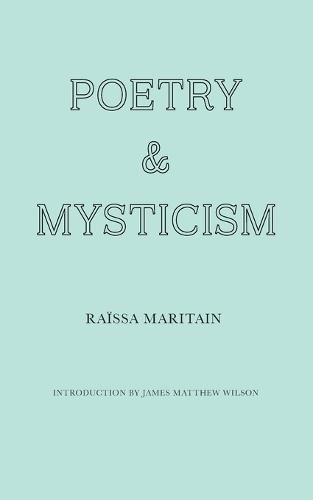Readings Newsletter
Become a Readings Member to make your shopping experience even easier.
Sign in or sign up for free!
You’re not far away from qualifying for FREE standard shipping within Australia
You’ve qualified for FREE standard shipping within Australia
The cart is loading…






This title is printed to order. This book may have been self-published. If so, we cannot guarantee the quality of the content. In the main most books will have gone through the editing process however some may not. We therefore suggest that you be aware of this before ordering this book. If in doubt check either the author or publisher’s details as we are unable to accept any returns unless they are faulty. Please contact us if you have any questions.
These two essays by Raissa Maritain- Sense and Non-Sense in Poetry and Magic, Poetry, and Mysticism -comprise an often forgotten but significant contribution to Catholic letters. Maritain considers the way true poetry always transcends its logical sense in order to convey a poetic sense. Poetry is a human thing, but it stirs the human beyond mere logic in the direction of the divine. In his introduction, James Matthew Wilson explains that, Poetry is the fruit of a contact of the spirit with reality, which is in itself ineffable, and with the source of reality, which we believe to be God himself in that movement of love which causes him to create images of his beauty.
While the poet might be prayerful and the mystic might wax poetic, there is a fundamental difference which separates the poetic experience from the mystical experience: while the poet progresses toward the Word, the mystic tends toward Silence. As Raissa Maritain expounds, mystics may be moved to describe their heightened experiences, but for them this expression is not a means of completing the experience. For the furnishing of her interior castle, a mystic like St. Teresa of Avila needs no speech; her talk, the record she left us of the prayer of quiet, is only a result of superabundance, a generous attempt at communication.
The poet, on the contrary, cannot do without words. They are the vital stuff of his service to the world. Albert Beguin corroborates Maritain’s conclusion, contending that whatever value one attributes to the poetic act, it remains an act submitted to the necessity of form. It ends at the word. On the other hand, the poetic word points beyond language, ever striving for a fuller communion with reality and its Maker.
Inhabiting the tensions between sense and nonsense, poetry and mysticism, articulation and its absence, Maritain manifests the hidden mysteries at the heart of all poetry worthy of the name.
$9.00 standard shipping within Australia
FREE standard shipping within Australia for orders over $100.00
Express & International shipping calculated at checkout
This title is printed to order. This book may have been self-published. If so, we cannot guarantee the quality of the content. In the main most books will have gone through the editing process however some may not. We therefore suggest that you be aware of this before ordering this book. If in doubt check either the author or publisher’s details as we are unable to accept any returns unless they are faulty. Please contact us if you have any questions.
These two essays by Raissa Maritain- Sense and Non-Sense in Poetry and Magic, Poetry, and Mysticism -comprise an often forgotten but significant contribution to Catholic letters. Maritain considers the way true poetry always transcends its logical sense in order to convey a poetic sense. Poetry is a human thing, but it stirs the human beyond mere logic in the direction of the divine. In his introduction, James Matthew Wilson explains that, Poetry is the fruit of a contact of the spirit with reality, which is in itself ineffable, and with the source of reality, which we believe to be God himself in that movement of love which causes him to create images of his beauty.
While the poet might be prayerful and the mystic might wax poetic, there is a fundamental difference which separates the poetic experience from the mystical experience: while the poet progresses toward the Word, the mystic tends toward Silence. As Raissa Maritain expounds, mystics may be moved to describe their heightened experiences, but for them this expression is not a means of completing the experience. For the furnishing of her interior castle, a mystic like St. Teresa of Avila needs no speech; her talk, the record she left us of the prayer of quiet, is only a result of superabundance, a generous attempt at communication.
The poet, on the contrary, cannot do without words. They are the vital stuff of his service to the world. Albert Beguin corroborates Maritain’s conclusion, contending that whatever value one attributes to the poetic act, it remains an act submitted to the necessity of form. It ends at the word. On the other hand, the poetic word points beyond language, ever striving for a fuller communion with reality and its Maker.
Inhabiting the tensions between sense and nonsense, poetry and mysticism, articulation and its absence, Maritain manifests the hidden mysteries at the heart of all poetry worthy of the name.